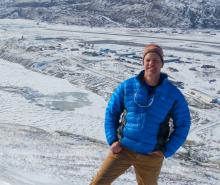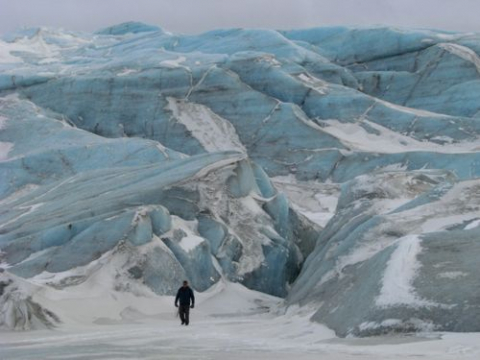
Russell Hood grew up on the Central Coast of California, a place known for its quaint, Spanish-themed towns. After completing high school he sought out a more northern climate and a small, liberal arts college. Reed College in Portland, Oregon fit the bill. While there he earned a bachelor's degree in physics.
After college Mr. Hood worked seasonally for the US Forest Service building and maintaining trails in Wyoming's Wind River Range. The lure of Alaska pulled hard on him and soon he was working seasonally in Southeast Alaska, educating visitors at a brown bear viewing area and performing cabin and trail maintenance in the temperate rain forest. He eventually moved to Anchorage, Alaska a few years later, completing his ever northward migration. In Anchorage he entered graduate school and earned a master's degree in teaching. Immediately thereafter he became a science and math teacher in the Anchorage public school system, teaching primarily physics and AP in the local high schools.
Anchorage, AK
United States
At the 2014 PolarTREC Orientation, Russell connected with local researcher Dr. Steve Okkonen and continued collaborations with the high schol science club in a study of sea ice formation in Cook Inlet in Alaska.
Russell also started the East High Solar Club with a mission to educate students about solar power and to construct portable, stand-alone solar units to be donated to non-profits for use in remote regions of the world. Since then the club's work has attracted wide interest from throughout our community. They have built and donated five units that are currently in use in Africa.
My students are often future engineers and scientists. I am applying to PolarTrec because I wish to share with them the uniqueness of the polar regions as well as the fascinating science that goes on there. The importance of these regions are multifaceted, but a couple of things stand out in my mind.
First, these regions are unlike any other on the planet. As such there is much scientific study that focuses on the exclusivity of these regions. Second, these two regions play a huge role in how our planet will be affected by climate change. Taken together, it is for these reasons that the polar regions are playing an ever more important role in the scientific community. And much of this science needs to be communicated to public so they can make informed decisions that may well affect all of us.
What I hope to gain from the experience is to come home with a message far deeper than "This is where I went and this is what I did." Rather, I'd like to be able to say "This is why you should be interested in what I just experienced." And then I would tell them why.
Russell has been in continuous contact with his research team at NASA, and attended OIB meeting at Goddard.

